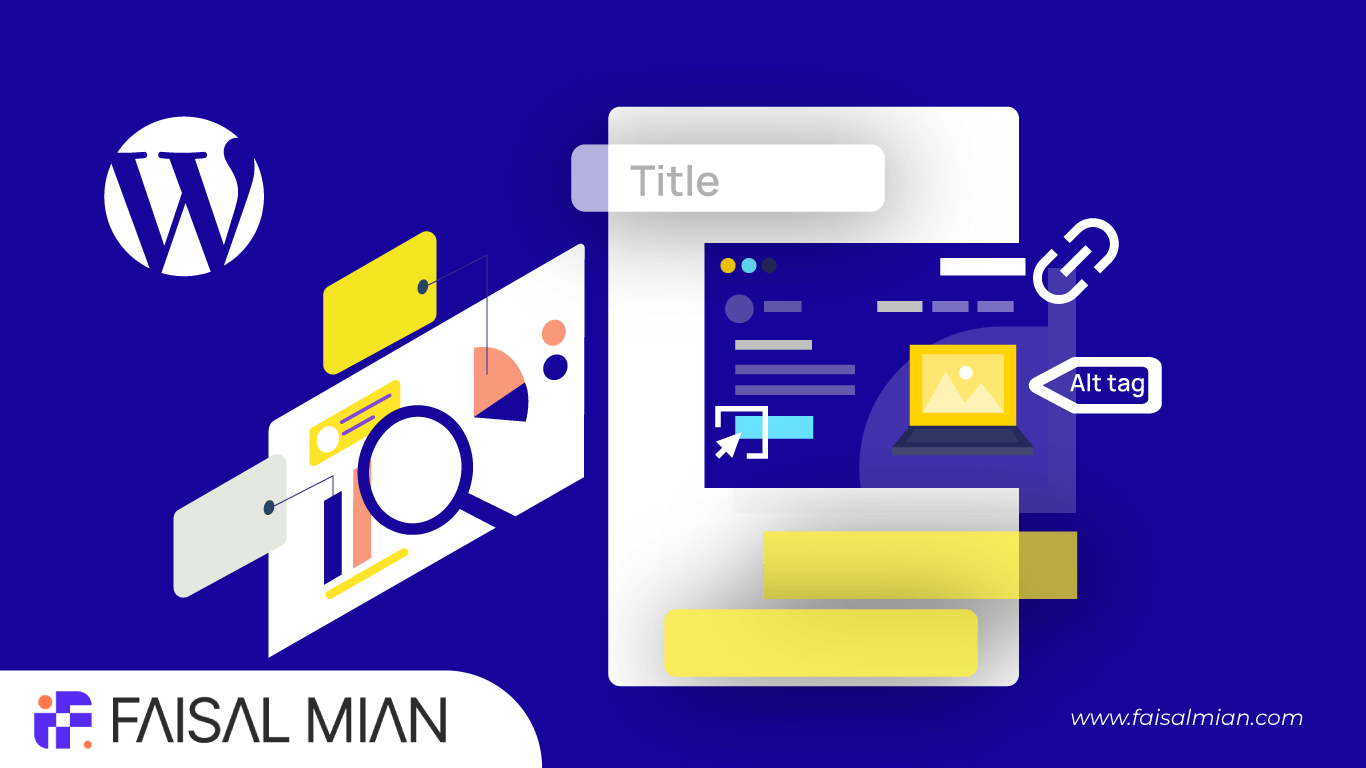Did you know that Google uses over 200 factors to rank your website pages? That’s a lot to consider! But did you also know that On-Page SEO isn’t one of them? Don’t worry; I’m here to help you understand how to optimize your pages for success.
In this blog post, I will reveal my strategy for improving WordPress on-page SEO to achieve a 90+ On-Page SEO score for my WordPress blog. I’ll break down the three main components of SEO and focus on the one that’s often overlooked: on-page SEO. You’ll learn how to optimize your pages for the best possible results and attract organic traffic to your site.
You’re in the right place if you’re struggling with low organic traffic despite having an old website or a newbie who hasn’t done any On-Page SEO yet. I’ll give you actionable tips and tricks to improve your website’s On-Page SEO score and help you rank higher on Google. You’ll be able to see real results in no time!
Three major components of SEO:
- Technical SEO (Site Structure)
- On-Page SEO (Individual Page Optimization)
- Off-Page SEO (Link Building)
Here, we discuss only On-Page SEO and how to implement it for a better WordPress On-Page SEO score.
How to do best on-page SEO practice with a free plugin called RankMath. We’ll discuss this shortly.
You might be on this page because of the following reasons, and you’re looking for an answer:
- You’ve got an old website, but your current WordPress on-page SEO is not getting organic traffic. Or
- You have a new website, but you’ve not done WordPress On-page SEO for the focus keyword
If you think you can’t do it by yourself. You can contact me, and I will apply the same tactics.
What is On-Page SEO?
SEO stands for Search Engine Optimization. It is a process for optimizing content on a web page to make it easy for your audience and Search Engines to find.
It is not only for your audience but also helps Search Engines (SEs) crawl your site. If you’re writing content that the audience wants, then these SEs help boost your ranking.
Site speed also significantly impacts website pages; if you focus on on-page SEO and not on Site structure and speed, you will not help your audience and SE.
The audience wants quick access to your page; if it loads slowly, it will increase your bounce rate.
Google wants its users to easily and quickly access the information they type on Google. Don’t make your site fluff; create easy navigation throughout all pages.
Google introduced a new algorithm to understand your content. The BERT (Bidirectional Encoder Representations from transformers). This update helps Google to deeply learn about words used in a sentence, with all the nuances of context.
The impact of this update is 10% on search queries. And it is a big update announced by Google in five years.
Basic and Important things that you should follow when you are doing WordPress On-Page SEO for an Individual Blog post or Page:
Let’s dive right in
Title and Meta Description Optimization
Title and meta description are highly important in WordPress on-page SEO. They help search engines, and the Audience understands what you put in the body text.

If you think you’re not good at crafting an SEO-optimized title, you can try Share through the headline. It helps you check all the scores needed to write a compelling title.
To optimize your title and meta description, you should add your focus keywords in the title and meta description, as demonstrated by the above image, with the focus keyword “SEO Content Writing Skills.”
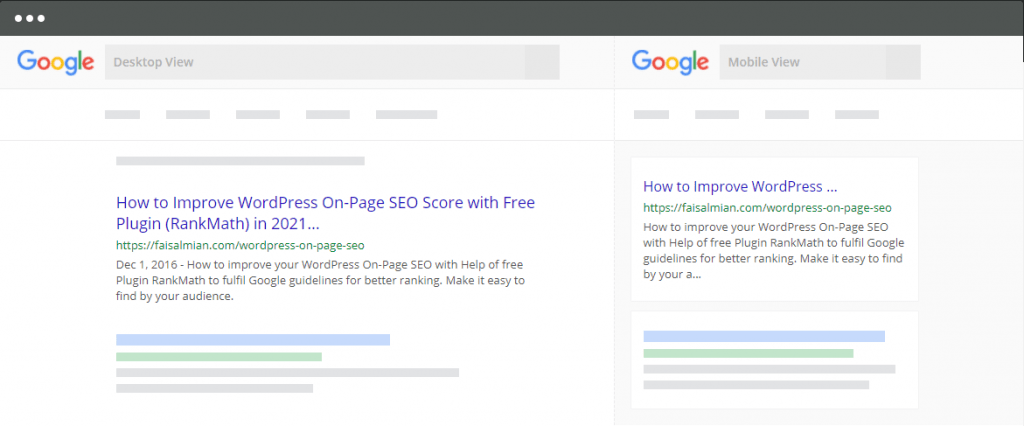
URL or Slug Optimization
URLs or slugs are the addresses Google uses to find your blog’s post pages. They help users match their search intent. Using focus or primary keywords helps both Search Engines and the Audience click on your post easily.
The character length should be a maximum of 75 characters. If it is more than this, RankMath suggests you keep this under these characters.
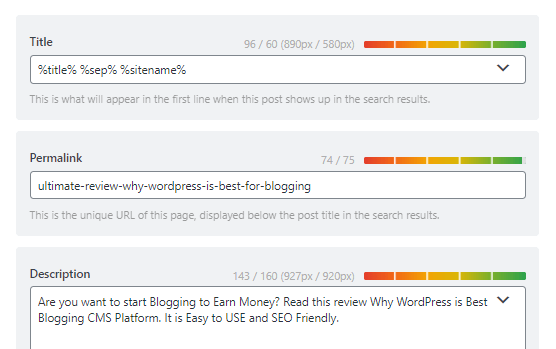
To better understand the URL for your Blog Page, read this
WordPress is smart enough and will add your title as a slug; you should re-write it to keep it concise and under 75 characters.
If you’re not seeing your custom URL with your primary keywords, enable your permalinks with post names. You can visit this page by following this path: Setting>Permalinks
I.e., http://versiontwo.local/sample-post/
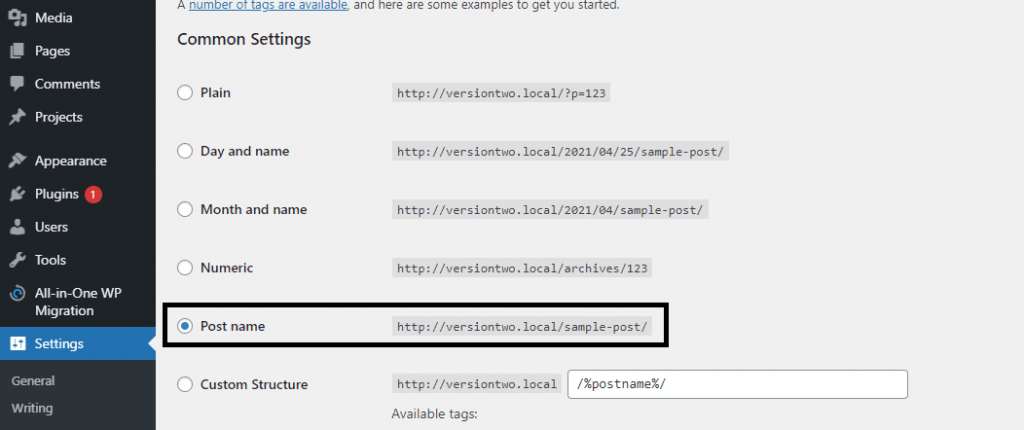
Keyword optimization in content
Keyword density is an integral part of your writing part. Include primary keywords naturally. Avoid keyword stuffing on your blog page, as it is a bad tactic in the Google algorithm.
While doing WordPress on-page SEO, check how often you used your primary keywords in the content. There is no specific rule for adding keywords, but it should be between 1%-1.5% in your content. So it looks natural.
Here is an example of keyword density: a blog post contains 2500+ words, and primary words repeat 2.5% of the time.

Add Internal and External Links
Internal links are those which point to another page within the same domain.
External Links: These are links to other sites from your domains. You can also add attributes like do-follow and No-follow.
As you can see from the attached image.
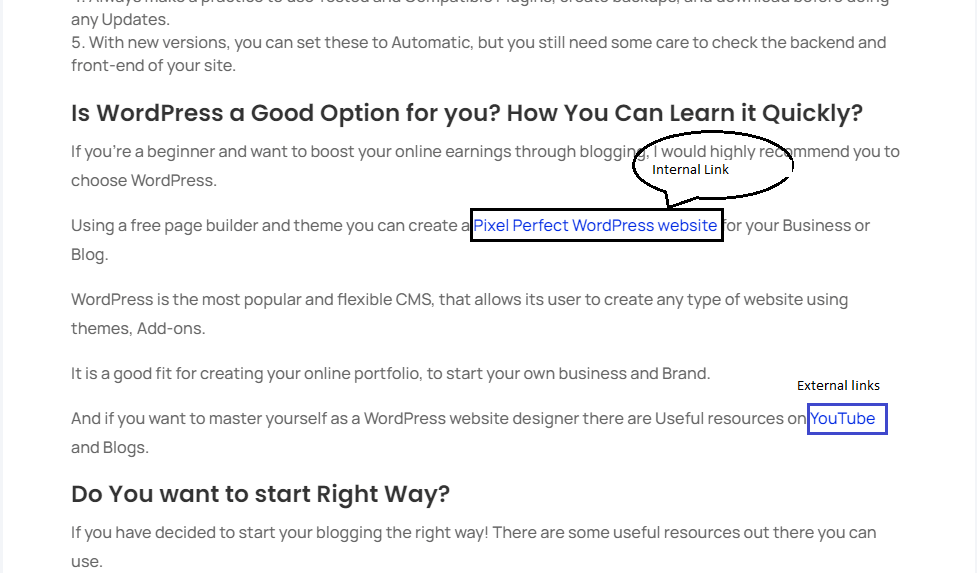
These links help Search Engine bots crawl your site to see related information on your site or other sites. Linking to other authoritative sites also helps build authority.
Make these links easy to navigate so that they can help users. Adding “open in new tab” allows your audience to see the linked pages in a new tab. This way, they get no distraction from the current page, and your on-site time will increase.
Media or Images Alt Tags
Google can’t read your image; what it reads are HTML tags. Add your description so that the Search Engine understands the context you want to deliver.
Whenever you add media (Video, Images, Files, SVG, etc.), add Alt Attribute tags.
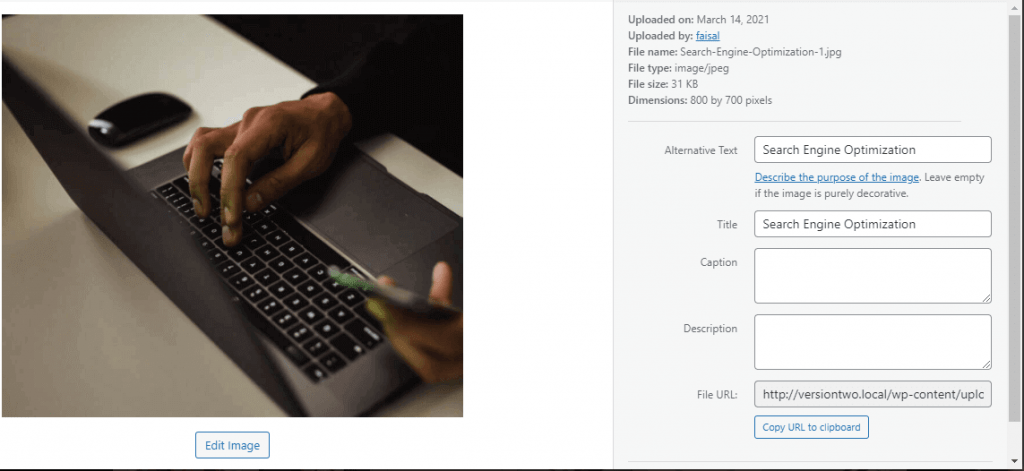
If sometimes the image takes more time to load, it not only helps search engines but also creates a better user experience. Image or Media Alt Text will be displayed.
Use more than 3-4 Media elements in your blog post, with primary keyword.
Content-Length
Google uses more than 200 factors to rank content, but Google doesn’t mention anything that tells us about content length.
However, some best practices and studies strongly suggest that Google loves significant content, which correlates more with ranking.
Not all topics on the internet have the same context. For a recipe, you can’t write content with more than 200–300 words, and for a guide like: “Why WordPress is The Best Blogging Platform,” you can’t summarize all the content in less than 1000 words.
We are using Rankmath, a free plugin for WordPress on-page SEO. You can easily adjust the requirements and see suggestions for where to add or remove them.
If we follow this plugin’s guidelines, our content length should be more than 2500 words for a 100% score.
As I have for my blog post “The Ultimate Review – Why WordPress is The Best Blogging Platform for You in 2023-24?” the SEO Score for this is 100/100.
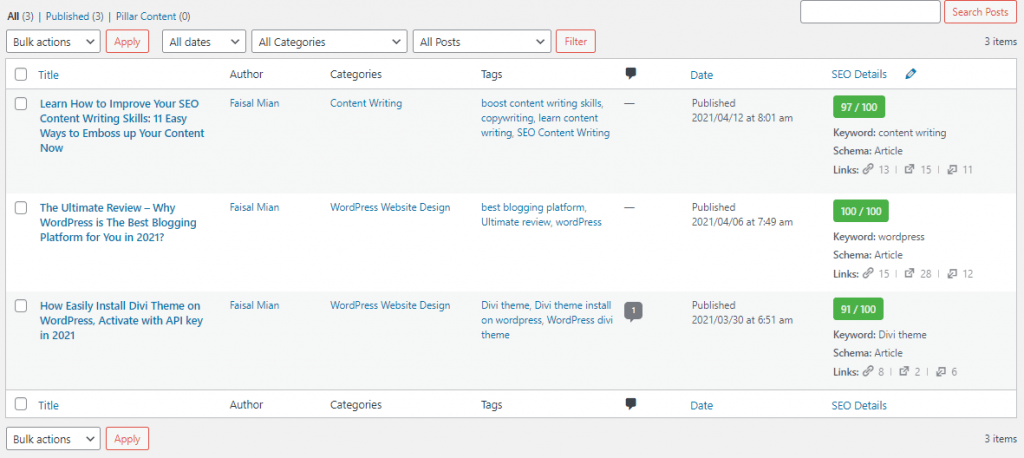
Check Readability score
Write your content as simple, concise, and easy to readable. As it is a common saying in the advertising industry, people read your headline first and then read the content.
You’re wasting time and money if you cannot engage with your headline. On the other hand, if there is a compelling headline, people will click on it. You are increasing your “Click-Through Rate,” which helps Google understand that there is more relevant information and will give you a chance to rank for such keywords.
Include positive or negative sentiments, power words, and numbers.
Suppose you are wondering how to strengthen your content writing skills. There are countless other sources on different social media channels.
As I mentioned, you should write for the audience and then optimize it for Google.
Adding a table of content
If you write guidelines for “how to do On-Page SEO,” you must include steps that help the reader understand.
Some readers will want to read a specific step, and others will want to read all of your blogs. You should create easy navigation so they can access particular steps with just one click.
Adding a Table Of Contents is the best way to navigate each step.
Google also uses these sub-links and includes them on SERP. Here is an example to show more links to the same page.

There is no guarantee that doing this will result in this type of result. But if you do not include TOC, it will not be possible to show such links on Google SERP.
Some useful plugins help you add TOC to your content to get a better WordPress on-page SEO performance score.
To Summaries, WordPress On-Page SEO:
- Add Primary keywords in the Title and Meta Description
- Optimize URL or Slug with Target Keywords
- Keywords Optimization
- Add Alt Tags for Images and Media
- Add Internal and External Links
- To create fresh content, it should be concise and simple.
- Add table of Content
Here are infographics that describe 7 steps for Doing WordPress On-Page SEO.
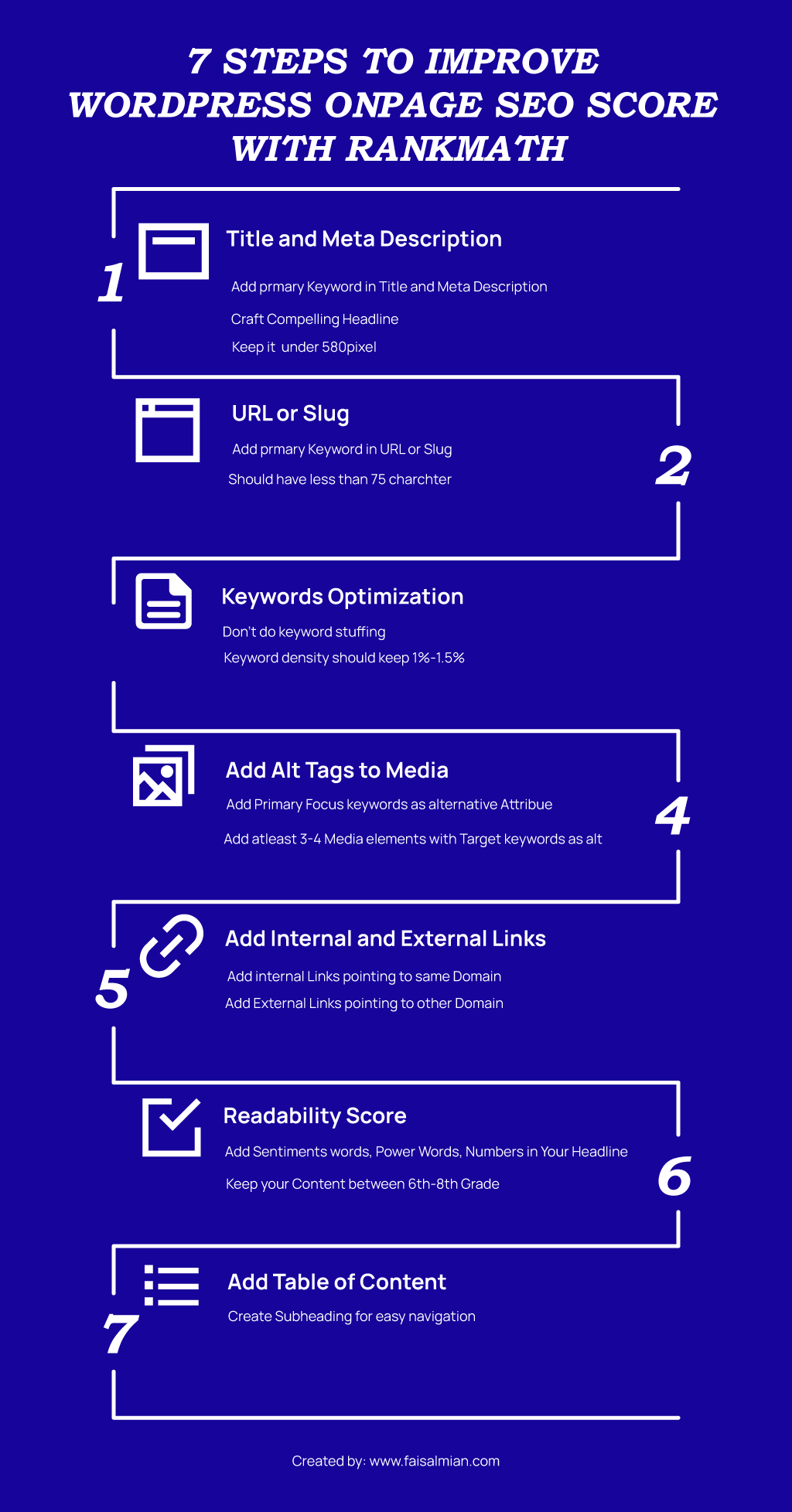
Do You Still Need Help with Doing WordPress On-Page SEO?
If you have a workload and do not have time, you can spend time doing your blog post’s on-page SEO. That’s no problem; I’m providing an exclusive service for on-page SEO here and on a freelance platform.
I have achieved a 100/100 score by writing SEO-optimized content for Techs and businesses. I will do the same for you. Contact me to discuss your project or visit my SEO service.

